*BNS will be used in place of Bandai Namco Studios for the rest of the article for brevity.
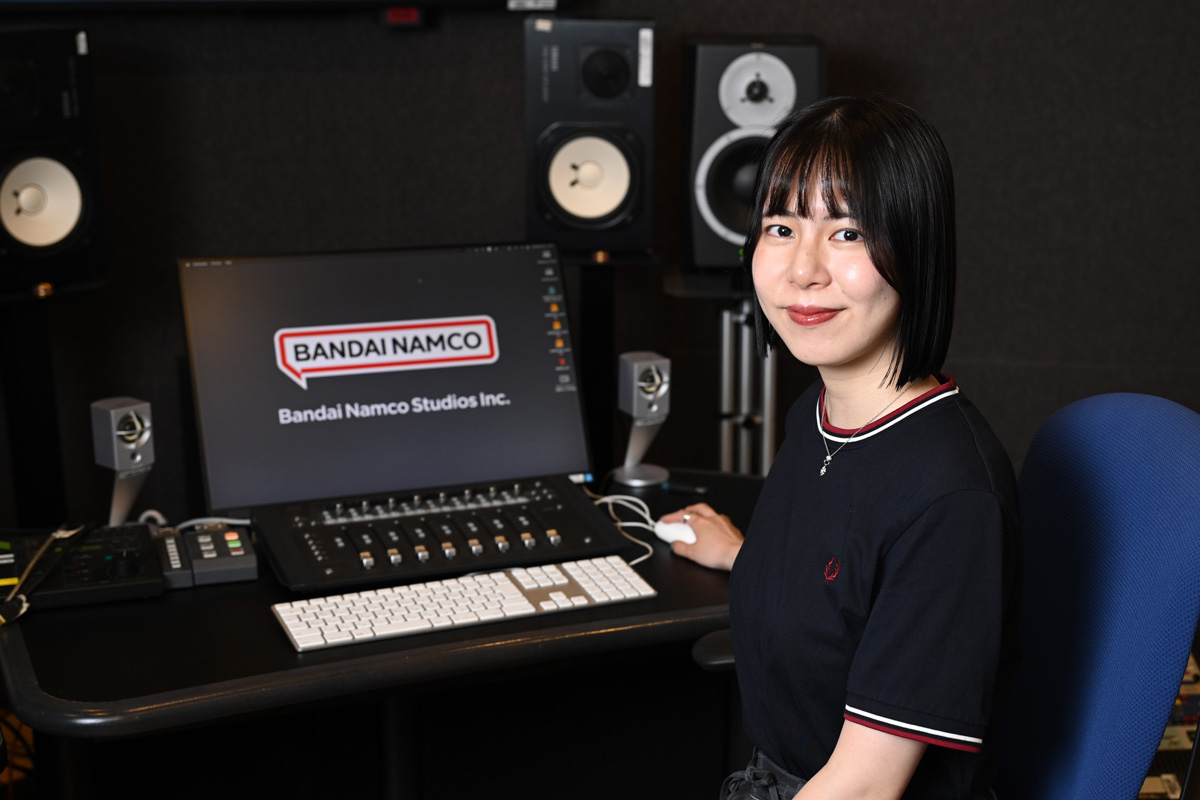
Sound Creator Mei Osawa
Becoming a Sound Creator
―Can you tell us your current affiliation and what you’re working on now?
I’m assigned to the Sound Department of the Tech Studio.
Most of my work is currently related to music production and direction on THE IDOLM@STER Gakuen, and music direction for concerts. I’m involved in creating music for other content as well.
―Why did you decide to become a Sound Creator?
Both of my parents work in music-related fields, so I’ve been playing the piano since I was a child. And I was what you would call a “theatre kid”, so I had this vague idea of wanting to work in movies or TV dramas. When I was choosing where to go for university, I had a tough time choosing between a university where I could learn visual production, or leverage my love for music and become an incidental music composer for TV dramas. Ultimately, I chose the composition department at a university for musical studies.
―I see you had an interest not only in music, but also movies, TV dramas, and other forms of entertainment.
Yes, I became fascinated with bands during university, and was in the light music club. I also got involved with bands at other universities, planned events, and performed with the same band members for three years.
At the time, I realized I wasn’t the type of composer who would hole themselves up making music all day. I found it more fun and rewarding to go through the process of using my broad knowledge to make music with other people.
I also liked playing games since I was in middle school, so I also thought about working in the games and anime industries. When I looked into my options, I found a game company where I could make music for games and also other content, so I tried my luck with them.
―Did you think about trying anything new to help you get into the game industry?
I applied to Bandai Namco Studios as a composer, but the job description included the production of sound effects and sound direction, so I began watching movies and playing games more carefully, paying attention to what sounds were used in each scene.
I also started making my own sound effects. It was self-taught, but I started around my third year of university.
―It must’ve been challenging to learn by yourself! What was being taught in your classes?
One of the more memorable classes used famous soul music as course material, and we spent a year arranging them into other genres, and we also did recordings for musical instruments and songs. It was the first time I sat in a recording studio in a direction role, and it was pretty fun! Looking back, I think the practice I had in school is helping me with my work now.
So I was doing coursework and supplementing that with self study.
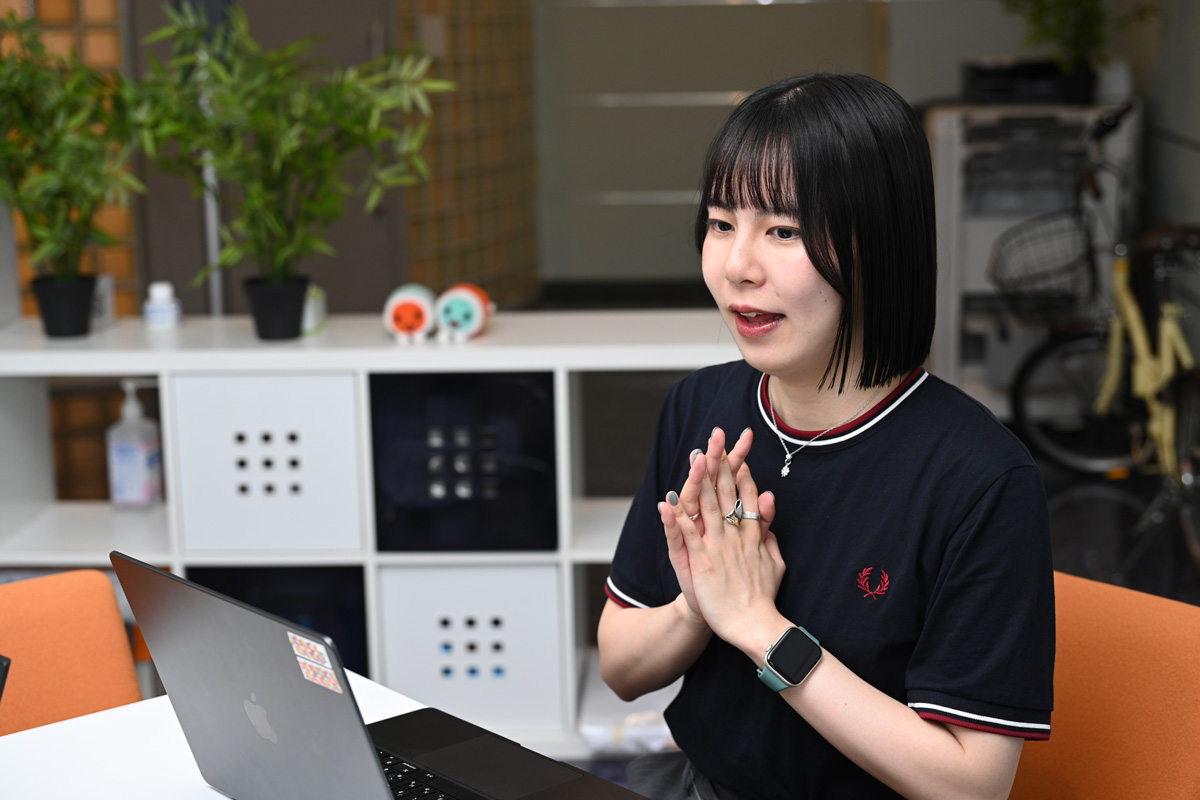
Memorable Work: Creating Experiences with Users, Feeling the Passion at a Concert Venue
―Do you have any memorable stories to share since you started working at BNS?
One was when I worked on vα-liv. The project involves trainees trying to make their idol debut, and I received an offer to make their first original song.
Normally, when you compose a song, you submit the finished product and that’s the end of it, but vα-liv is a project where the content is created with the Producers (users). I got to do things like share demo tracks featuring my guide vocals and ask them what the song’s title should be. It was novel and fun to have this experience where you create something with other people.
―That does sound fun! Is there another you want to share?
I have another one that’s not about games, but a concert. It was where I had to split a song for individual singers.
There are several singers in an idol group, so you have to split up the song and decide who sings which part. I recently realized that the crowd can “blow up” or be disappointed depending on how you do it (laughs).
That said, there’s no right answer when doing this, so you have to actually go to a concert to see what works and feel the passion of the crowd.
For example, if the song is too busy, the crowd can’t keep up, and the next part of the song ends up drowning out their cheers. You won’t notice these things without being in the audience. Things like, “This part really stands out, so let’s have everyone sing the next part to balance it out”. So that’s a recent memorable work experience where I adjusted the song based on what I felt at the concert.
―Is it different than how you made music when you were at school?
Yes, it’s completely different. When you compose at school, the music is the focus, so you make sure it’s consistent, the arrangement is good, the melody is good, all of that stuff. But when the goal is to have people enjoy the song, your priorities change. It becomes key to leave a strong impact.
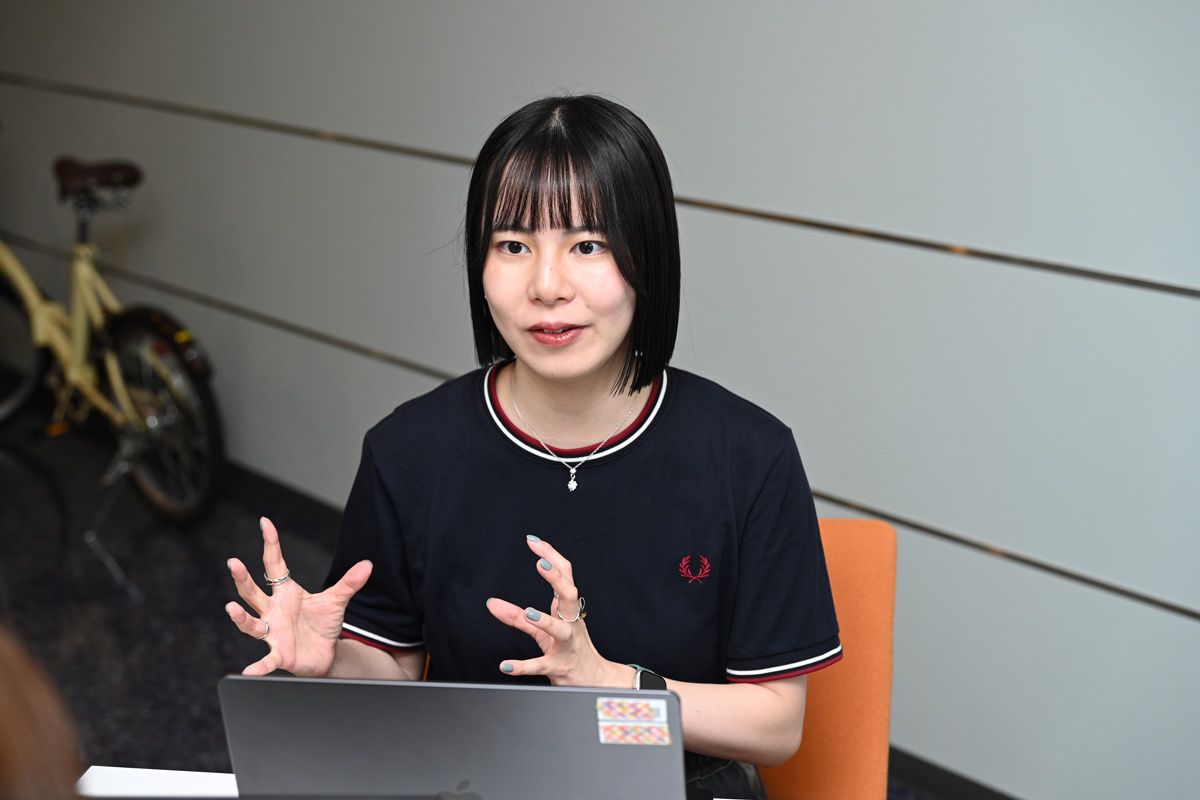
Composition Characteristics and Music Style
―Do you have anything you refer to when composing songs?
I listen to male idols in addition to female idols, especially K-pop. K-pop has a strong fanchant culture, so I reference the inflections in the music from them, as well as things like how rap/vocal parts are allocated.
I also watch music videos that have high view counts, regardless of the genre. I make music for games, but I try to keep up with general trends in music and visuals.
―It’s nice to stay updated on a wide breadth of knowledge.
―So what do you pay particular attention to when you do audio work?
I’d like to talk about this from a composition and a direction perspective.
From a composition perspective, I’ve paid particular attention to melody even as a university student. When I compose a song, I try to focus on creating melodies that let the intonation of the lyrics come through as naturally as possible.
For example, it sounds unnatural if you had a melody that made you sing “Mei Osawa” like “Me↓i↑ Osawa” (“i” is emphasized), and a lot better if the song was composed to have it match a “Me↑i↓ Osawa” (“me” is emphasized) intonation.
I also keep in mind to match a dramatic melody with lyrics that have a strong message.
―Do you think about the lyrics when you compose?
It depends on the project, but I have to write my own lyrics sometimes.
Even when I don’t need to, I usually have some temporary lyrics or phrases in mind and match the music to the intonation of those words. The workflow I commonly use is to decide on the major themes, then compose the song and work on lyrics at the same time independent of each other, then finally bring the two together to complete the whole song. I think about the lyrics and instrumentals at the same time so this is how I work, but I might be the exception and not the rule.
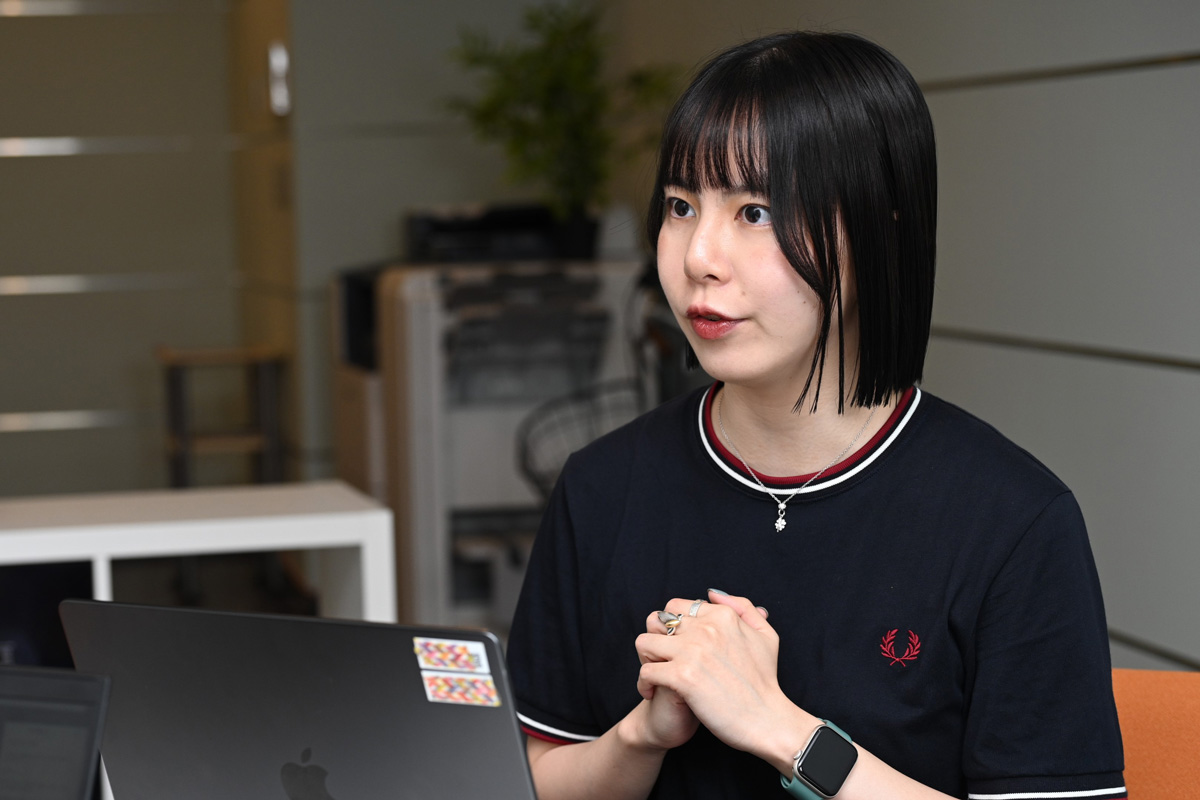
―Awesome! How about musical direction? Is there anything you pay particular attention to there?
I take care to try and “take things too far”.
For example, when I’m giving vocal direction to a voice actor (during a song recording), I ask them to start by putting “too much” expression in their voice. Even if the singer thinks they went too far, there are times when I want more out of them when I think about their vocals mixed with everything else in the final song. That’s why I start by asking them to give it everything they’ve got and then tune down if it turns out to be too much.
When we outsource music to a creator or an artist, I ask them to forget that it’s for an idol, game or anime and just focus on creating. The music ends up sounding “safe” if they make it with any preconceptions, so I tell them not to limit themselves and start by going all out.
―There must be a lot of things you need to think about since your work covers a wide breadth of disciplines, from music production, recording, and direction.
There is! For example, there was an artist who made music that I thought would really match a particular idol, but it was in a different genre than what the idol usually sang… But I thought we needed to have them try their hand at new genres to expand their range of expression, so I arranged the arguments in a convincing way and presented them to various people. Ultimately, we got to make an offer to the artist I wanted!
It’s not just about making good music, I also need to keep in mind what the song means to the idols themselves and how to satisfy the fans who love them when drafting and producing music.
Job Satisfaction and Future Challenges
―What part of the job feels rewarding?
It felt most rewarding when my name appeared in the end credits. When I think back to why I wanted to work in movies and TV, it wasn’t just because I wanted to create things, I also thought it would be pretty cool to see my name in the credits!
Even after I chose to pursue music, I still had this dream to get on the credits of something, so that hasn’t changed.
―There’s a sense of accomplishment you feel when you see your name in the end credits.
Yes. There’s pride and accomplishment, but it also comes with a strong sense of responsibility. It’s easy for people to target the names associated with a work when something happens, so I used to feel nervous when it came to putting my name on something. Nowadays, I don’t see it as just pressure, but I try to put a positive spin on it by thinking about it as being responsible for something I made.
―Were there any recent moments where the job felt rewarding?
When a song I worked on is sung at concert, the lighting and other visuals added to the music and the crowd excitedly cheered and clapped at the performance. When that happened, I felt an irreplaceable sense of accomplishment. I was moved when the intro started playing and the crowd cheered because they were excited for the song. You could feel the emotion from both the stage and the crowd.
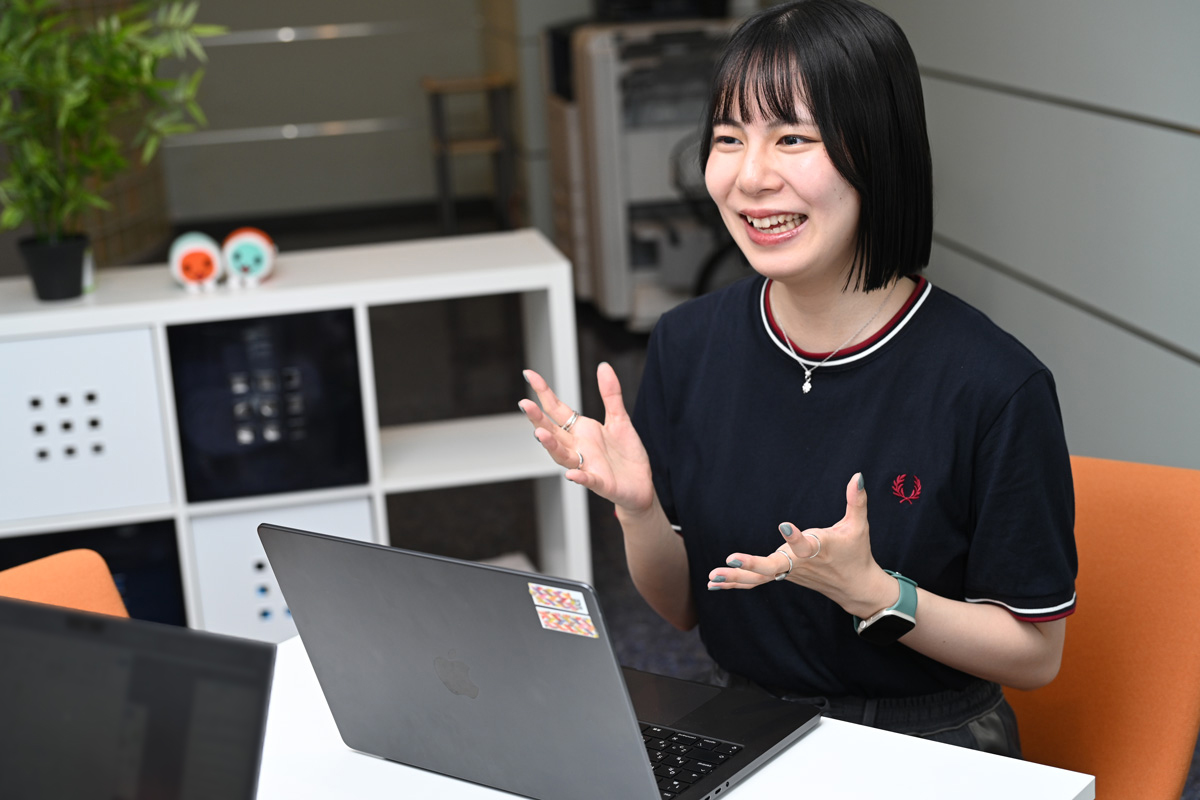
―What are your aspirations, or are there any challenges you want to take on in the future?
This is a little abstract, but I would like to make music that widens the interests of its listeners.
I enjoy a variety of idols and anime, and I get extremely excited when I see a character do something they normally wouldn’t do. What’s more is that even if I wasn’t interested in the character before, I started liking them as soon as they showed another side to themselves. I’ve felt the power of widening my interests first-hand, so I want to create the motivation for someone’s dive into a new rabbit hole.
But there’s risk there as well. For a real person, whatever they do becomes a part of who they are. But when it comes to created content, it’s totally possible that some people would think “Why did you make the character do this?”or “Your interpretation of my fave is wrong, they would never do this.”
That’s why people avoid making daring changes the longer a series has been around, but I think those risks create opportunities to leave a lasting impact and impression. So I want to embrace taking bold chances rather than avoid them, and create new appeal for characters and their content.
―Lastly, please tell us your personal mantra.
“Keep an ear to the ground for what you like”.
I have a wide range of interests, but have a hard time focusing on any one thing for a long time, so I think I get tired of things easily. That said, I am proud that I’ve been interested in many things throughout my life, so when I say “keep an ear to the ground for what you like”, I’m just describing my way of life.
Everyone has something they don’t like. Instead of saying “that’s not for me” and avoiding it, try to find the parts you like or admire. So that’s my mantra, my way of life, and who I aim to be as a creator.
―Thank you very much!
THE IDOLM@STER™& ©Bandai Namco Entertainment Inc.





